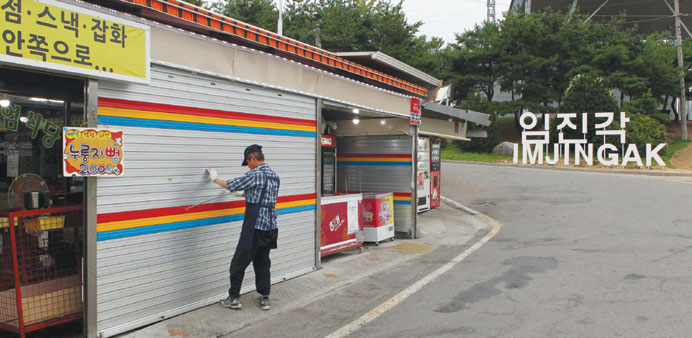AFP/Seoul
South Korean artillery units fired dozens of shells into North Korea yesterday in response to a rocket fired over the heavily-militarised frontier, as both sides pushed already elevated cross-border tensions to dangerously high levels.
North Korea followed up with an ultimatum sent via military hotline that gave the South 48 hours to dismantle loudspeakers blasting propaganda messages across the border or face further military action.
The message, issued by the Korean People’s Army general staff, stipulated that the 48-hour period would expire at 5pm (0800) on Saturday.
Direct exchanges of fire across the inter-Korean land border are extremely rare, mainly, analysts say, because both sides recognise the risk for a sudden and potentially disastrous escalation between two countries that technically remain at war.
Yesterday incident came amid heightened tensions following mine blasts that maimed two members of a South Korean border patrol earlier this month and the launch this week of a major South Korea-US military exercise that infuriated Pyongyang.
A defence ministry spokesman said South Korea had detected a rocket fired from the North Korean side across a western section of the border shortly before 4pm (0700 GMT).
The South’s Yonhap news agency said the rocket landed in a mountainous area not far from a South Korean military base in Yeoncheon county — some 60km north of Seoul.
There were no casualties or damage.
South Korean military units retaliated by launching “dozens of rounds of 155mm shells” targeting the rocket launch site, the defence ministry said in a statement.
“We have strengthened our military readiness and are closely watching movements of the North’s military,” it added.
The spokesman said South Korean troops had been placed on highest-level alert, while President Park Geun-Hye chaired an emergency meeting of her National Security Council and ordered a “stern response” to any further provocations.
A local government official in Yeoncheon county told AFP that residents of several border villages had been ordered to evacuate their homes for nearby shelters.
Dan Pinkston, Korea expert at the International Crisis Group in Seoul, said the motive for the initial North Korean rocket firing was unclear.
“It could always have been an error, but more likely it was the show of displeasure that the North has been threatening for a while now,” Pinkston said.
The incident will fuel tensions that have been on high simmer in recent weeks following the border landmine incident.
Seoul said the mines were placed by North Korea and responded by resuming high-decibel propaganda broadcasts across the border, using loudspeakers that had lain silent for more than a decade.
The North denied any role and threatened “indiscriminate” shelling of the loudspeaker units — a threat it reiterated in the ultimatum sent by military hotline yesterday.
It had also vowed retaliatory strikes after Seoul and Washington refused to call off their annual Ulchi Freedom military drill, which kicked off Monday and roleplays responses to an invasion by the nuclear-armed North.
North Korea regularly ups its bellicose rhetoric before and during the annual joint exercises, but rarely follows through on its threats.
In the past, its default response has been to test fire missiles into the East Sea.
“Sending a rocket over the border is surprising, because the inherent risks are just so big,” Pinkston said.
“If it had hit something strategic or caused any casualties, the South’s response would have been far stronger, and then suddenly we’re on the path towards a serious confrontation,” he added.
The last direct attack on the South was in November 2010 when North Korea shelled the South Korean border island of Yeonpyeong, killing two civilians and two soldiers. On that occasion, South Korea responded by shelling North Korean positions, triggering brief fears of a full-scale conflict.
In October last year, North Korea border guards attempted to shoot down some helium balloons launched across the land border by activists and carrying thousands of anti-North leaflets.
The incident triggered a brief exchange of heavy machine-gun fire and scuppered a planned resumption of high-level talks.

A shopkeeper closes the shutters of his store near the demilitarised zone separating the two Koreas in Paju, South Korea, yesterday.
